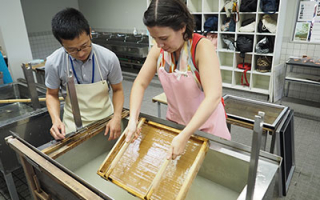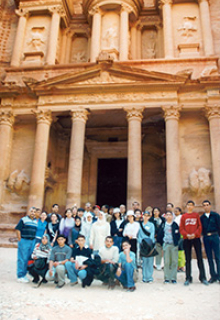This series of records include the planning, coordination, organization and implementation of long-term training programmes held in partnership with other organizations; a range of specific projects, including courses, conferences, workshops and other events; and the relations and exchange of correspondence with partner institutions, lecturers and course participants (who, in many cases, became influential conservators and conservation policymakers in their home countries and beyond.) Records also document the specific capacity-building role of ICCROM as an Advisory Body to the 1972 World Heritage Convention.
ICCROM programmes and projects deal with movable and immovable, tangible and intangible heritage worldwide for the benefit of humanity. Cultural heritage presents multiple facets that deserve to be dealt with both in their specificities/materiality (ICCROM has organized and still organizes courses on the restoration of specific materials such as wood, stone or Japanese paper) and in their broader social, economic, and environmental implications, for example by analyzing the relationship between cultural heritage and their communities, or the interlinkages between culture and nature.
Over the years, together with the support of its partners, ICCROM has developed and implemented numerous programmes and projects that reflect the evolution of methodologies and approaches to heritage conservation. We have witnessed a shift in the study of restoration techniques and materials to an overall heritage management approach, from traditional/prescriptive preventive conservation to a more integrated, predictive risk management approach focused not only on response, such as the reaction to a catastrophic event, but also in prevention and preparedness – for example, through the assessment of the various risks to allow comparison and prioritization.
Even if these projects were mainly conceived to build the capacity of heritage professionals from across the globe, ICCROM has consistently recognized and addressed the critical importance of the general public's awareness of the risks related to careless, dangerous and intensive use of cultural heritage. ICCROM developed awareness activities, such as "Media Save Art" (1990–2001), a successful programme of public advocacy conceived to address and involve the general public through an engaging approach, with a particular focus on schools and media, through audiovisual and poster competitions, students exchanges and "adoption campaigns" (i.e., the "Adopt a Monument" project).
As outputs of ICCROM's capacity-building activities, the Archives also preserve an essential collection of didactic materials composed of models and samples, as well as technical cards (1970s–1980s) about different subjects, such as 'Biology' by G. Giacobini, 'Biodeterioration' by Aiken and A. Bakkenist, 'Climate Control and Security in Museums' by Gaël de Guichen, 'Metals' by Albert France-Lanord, 'Paper' by Rita Cassano and Giuseppe Calabrò, 'Wood' by Bruno Mühlethaler, 'Stone' by Peter Rockwell and V. Starr, and 'Mural Paintings' by Paolo and Laura Mora. These materials are fundamental for understanding the history and evolution of conservation teaching, as well as the conservation and restoration techniques, tools and approaches used in past decades.
Inexhaustive list of ICCROM programmes and projects, including courses


